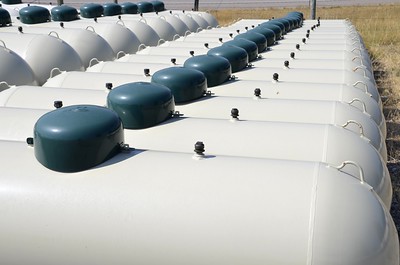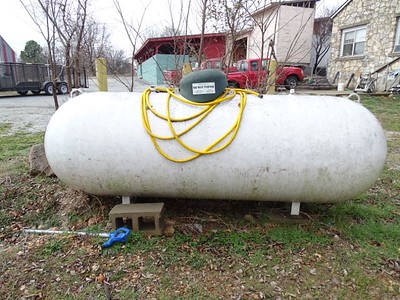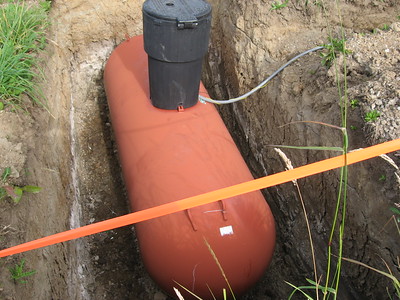
When you want to buy a 250-gallon propane tank, there are a few important factors to consider. These include proper installation, local regulations, and the intended use of the propane. Finding a reputable supplier, understanding the different types of tanks available and what works best for your needs and budget, and ensuring safety by following regulations and performing regular maintenance are all crucial steps in the buying process.
This guide will provide an overview of the key considerations when purchasing this capacity propane tank, including the types of tanks available, finding a supplier, proper installation, and ongoing maintenance and safety. It aims to assist you in making an informed decision and ensure that you end up with a propane tank that meets your needs and keeps it safe and secure.
Let’s Do Some Computation If This Size of Tank Fits Your Household
To estimate how long a 250-gallon propane tank might last for an average U.S. household, we need to consider several factors:
- Average Household Size in the U.S.: As of my last update, the average household size in the U.S. was about 2.6 people.
- Average Propane Consumption: This varies based on the appliances used and their BTU (British Thermal Unit) ratings. Common propane-consuming appliances include furnaces, water heaters, stoves, and clothes dryers.
- BTUs in a Gallon of Propane: One gallon of propane contains approximately 91,500 BTUs.
- Total BTUs: This would be 250 gallons times 91,500 BTUs/gallon, equaling approximately 22,875,000 BTUs.
Let’s calculate an approximate duration by considering the average BTU consumption of key household appliances:
- Furnace: Assuming a moderate climate and a furnace with a BTU rating of around 80,000 BTUs/hour. If used for 4 hours a day, it would consume 320,000 BTUs/day.
- Water Heater: A typical water heater might use around 40,000 BTUs/day.
- Stove: Average use could be around 30,000 BTUs/day.
- Clothes Dryer: With moderate use, let’s estimate 30,000 BTUs/day.
Adding these up gives a daily total consumption. Let’s calculate this.
Based on these estimates, a 250-gallon propane tank would last approximately 54 days for an average U.S. household, consisting of about 2.6 people. This calculation assumes moderate usage of key appliances such as a furnace, water heater, stove, and clothes dryer.
It’s important to note that actual usage can vary significantly depending on factors like the specific efficiency and BTU ratings of appliances, the climate, the insulation of the home, and the lifestyle of the inhabitants. Therefore, this figure should be used as a rough guide rather than a precise prediction. Regular monitoring of propane levels is advisable to ensure you don’t run out unexpectedly.
Specifications You Need to Know
- Capacity: 250 gallons (approximately 946 liters) of liquid propane.
- Size: The overall dimensions of this size of propane tank can vary depending on the manufacturer, but it will generally be around 2.5 to 3 feet in diameter and 8 to 10 feet in height.
- Material: Most 250-gallon propane tanks are made of steel, although some may be made of other materials such as aluminum.
Valve and Fittings: The tank will have at least one valve (the filling valve) and one fitting (the liquid withdrawal valve) that allow the propane to be filled into the tank and dispensed from it. - Safety Features: Many tanks have additional safety features such as pressure relief valves, which open to release pressure in case of an overpressure event.
Where Can You Buy This Size of Tank
The most common place is at a hardware store, local home improvement store, propane supplier, or local gas company. You can also buy them online, but make sure to do your research before buying one. To learn about where to buy, know these:
- Hardware stores also sell propane tanks. These tanks can be used for a variety of purposes, such as heating homes, powering outdoor grills, and fueling portable heaters and lamps. Hardware stores generally have experts available who can assist customers in choosing the right propane tank for their needs and answer any questions they may have. They might also have the necessary accessories or fittings that are required to connect the tank.
- Some local home improvement stores do sell propane tanks, in many different capacities. These tanks are usually available for purchase, and the store may also have experts available who can help you choose the right tank for your needs and answer any questions you may have. You can also check if they have any installation or delivery service as well, as some store provides this service as well.
- Propane suppliers are one of the main sources for purchasing propane tanks, in a variety of sizes and capacities. They specialize in providing propane fuel and related equipment, so they have a wide selection of tanks in different sizes and styles to choose from, and the employees at propane suppliers are generally well-versed in the products they carry. They can provide you with technical advice, and installation service and also assist you with understanding the regulations and compliance as well.
- Local gas companies also sell propane tanks. They may have a range of sizes and styles available to purchase, and they can also provide you with installation service, delivery of propane, and regular maintenance. Some gas companies may also have a leasing option as well where they can deliver the propane on a regular basis and handle the maintenance and inspection of the tank.
When you want to buy a 250-gallon propane tank, you want to make sure it’s from a reputable source. There have been cases of people buying used tanks that have leaks or other problems. It’s important to inspect the tank before purchasing it to make sure there are no visible signs of damage.
Tank Installation Requirements
Installing a 250-gallon propane tank involves several important steps and requirements to ensure safety and compliance with local codes and regulations. Here’s a general outline of the installation requirements:
- Choosing the Right Location
- Distance from Buildings: The tank should be installed at a safe distance from the house and any other structures. Local codes usually specify minimum distance requirements.
- Accessibility: The location should be accessible for delivery and maintenance, and not in an area prone to flooding or erosion.
- Level Ground: The tank must be placed on a stable, level surface, which can be a concrete pad, masonry piers, or pre-made tank stands.
- Compliance with Local Codes and Regulations
- Permits: Before installation, check with local authorities for any necessary permits or inspections.
- Zoning Laws: Ensure the installation complies with any relevant zoning laws or community regulations.
- Safety Considerations
- Clearance: Adequate clearance should be maintained around the tank for safety and ease of access.
- Ventilation: Ensure the area around the tank is well-ventilated to prevent gas accumulation.
- Protection from Impact: If there’s a risk of vehicle impact, protective barriers may be required.
- Professional Installation
- Certified Installer: Use a qualified, certified professional for installation to ensure it meets all safety standards and regulations.
- Inspection: Have the installation inspected and approved by a qualified authority if required.
- Connection to Appliances
- Proper Piping: Use the correct type and size of piping for connecting the tank to your appliances.
- Pressure Test: Perform a pressure test to check for leaks in the system.
- Regular Maintenance
- Inspections: Regular inspections by a qualified technician are important to maintain safety and efficiency.
- Rust Prevention: Regularly check for rust or corrosion and address any issues promptly.
- Emergency Preparations
- Instructions: Ensure all household members know what to do in case of a propane leak.
- Accessibility: Keep the area around the propane tank clear to allow for quick shut-off in emergencies.
Remember, specific requirements can vary based on location, so it’s important to consult local codes and a professional installer to ensure all regulations are met. Regular maintenance and safety checks are crucial for the long-term safe operation of the propane tank.
Importance of Hiring a Professional
If you’re considering installing a propane tank on your property, it’s important to hire a professional to do the job. While it’s possible to install a propane tank yourself, there are many risks involved. A professional will have the experience and knowledge to properly install your tank, ensuring that it’s done safely and correctly.
There are several reasons why it’s important to hire a professional when installing a propane tank.
First, propane is a highly combustible gas. If the tank is not installed properly, there could be a gas leak which could lead to an explosion or fire. Second, propane tanks are heavy and difficult to move. If you try to install the tank yourself, you could injure yourself or damage the tank. Third, a professional will know how to properly connect the tank to your home’s plumbing and gas lines. This is a complicated process that requires special training and expertise.
Hiring a professional to install your propane tank is the best way to ensure that the job is done safely and correctly. Don’t take chances with your safety – hire a pro!
Local Regulations and Permits
Most communities have regulations in place governing the installation of propane tanks. It is important to check with your local authorities to determine what permits or approvals may be required before proceeding with installation.
In most cases, a permit will be required from the city or county in which the tank will be installed. The permit process typically includes a review of the proposed installation site and a fee. Once the permit is approved, the installer will need to obtain a certificate of insurance from their propane supplier.
The installer will also need to comply with any local fire codes and other regulations. A final inspection of the installation by the local authorities may be required before the tank can be filled with propane.
Choosing the Right Location
When it comes to installing a propane tank, the location is key. You want to choose a spot that is level, well-drained, and at least 10 feet away from any buildings or combustible materials. The tank should also be placed in an area where it will not be obstructed by trees, shrubs, or other obstacles.
Here are a few things to keep in mind when choosing the location for your propane tank:
- The tank should be placed on level ground.
- The tank should be well-drained to avoid any waterlogging issues.
- The tank should be at least 10 feet away from any buildings or combustible materials.
- The tank should not be obstructed by trees, shrubs, or other obstacles.
Check with the Local Zoning Department for Any Regulations About the Installation of 250-gallon Propane Tank
To determine if there are any regulations about the installation of a 250-gallon propane tank, you can contact your local zoning department. This department is responsible for enforcing local zoning laws and regulations, which may include rules related to the installation of propane tanks.
When you contact the zoning department, you can ask about the specific regulations and permits that may be required for installing a tank of this size. They may also be able to provide information on the zoning requirements for where the tank can be installed.
It’s also a good idea to check with any homeowners association or local community association you may be a part of, they may have their own set of regulations that you need to comply with.
You should also check with the local fire department and building department, they may have some specific regulations or requirements related to the tank as well. They also can provide you with information about the safety regulations and procedures that you need to follow to keep your tank and your property safe.
It’s important to make sure you are in compliance with all applicable regulations before installing a propane tank, and to work with a professional to ensure the tank is installed correctly and safely.
Cost to Buy 250 Gallon Propane Tank
The cost of buying a 250 gallon propane tank can vary depending on the brand, size, and quality of the tank. The average cost for a 250 gallon propane tank is $500. However, prices can range from $350 to $1,000.
Used vs. New: Which One to Buy
There are pros and cons to both used and new propane tanks. Here are some things to consider when making your decision:
Used propane tanks may be less expensive up front, but they may not be in as good of condition as a new tank. You’ll need to inspect a used tank carefully before purchasing to make sure there are no leaks or other damage.
New propane tanks will be in good condition and ready to use right away. They may be more expensive up front, but you won’t have to worry about hidden damage or repairs.
Both used and new propane tanks need to be properly maintained. This includes regularly checking for leaks, proper storage, and regular cleaning. Neglecting maintenance can lead to problems down the road, no matter what type of tank you have.
Making the decision between a used and new propane tank comes down to personal preference and budget. Both can be good options if they are properly maintained.
Some Tips in Buying This Size of Tank
If you’re thinking about buying a 250 gallon propane tank, there are a few things you should know first. For starters, 250 gallons is a lot of propane – enough to supply a large home or small business. It’s also a significant investment, so you’ll want to be sure you’re getting the best possible deal.
Here are a few tips to help you make the most of your purchase:
- Shop around – There’s no need to pay more than you have to for your propane tank. Compare prices from different suppliers before making your final decision.
- Consider used tanks – If you’re on a budget, you may want to consider buying a used tank. Just be sure to have it inspected by a qualified technician before use.
- Know your needs – Before buying anything, it’s important to know exactly what you need. Make sure you know the size of your home or business, and how much propane you’ll realistically use in a given year. This will help you determine the right size tank for your needs. A 250 gallon tank is ideal for small-medium homes.
- Have it delivered and installed by professionals – Once you’ve made your purchase, it’s important to have the tank delivered and installed by qualified professionals. This will ensure that it’s properly set up and ready to use when you need it.
Other Things You Should Know in Purchasing
If you’re looking to purchase a 250 gallon propane tank, there are a few things you’ll want to keep in mind.
First, you’ll need to decide where you’ll be placing the tank. It’s important to choose a level spot that’s easily accessible for refueling. You’ll also want to make sure the tank is far enough away from your home or business that it won’t pose a safety hazard.
Once you’ve found the perfect location for your tank, the next step is to choose the right size. A 250 gallon tank is a great option for many homes and businesses, but it’s important to make sure it will suit your needs. If you have a large home or business, or if you plan on using propane for high-demand appliances like a pool heater or generator, you may need a larger tank.
You’ll need to select a reputable supplier who can deliver and install your new tank. Make sure to compare prices and services before making your final decision. With a little research, you can find the perfect 250-gallon propane tank for your needs.
If you live in a rural area, you will most likely need to purchase your tank from a propane supplier. However, if you live in an urban area, there may be several retailers that sell propane tanks.
The thing to consider is the warranty. Most propane tanks come with a five-year warranty. However, some companies may offer a longer warranty for an additional cost.
To Leave a Final Word
Buying a 250-gallon propane tank can be a great investment for those who use propane for heating, cooking, or powering certain vehicles and equipment. There are a few important factors to consider when purchasing a propane tank, such as proper installation, local regulations, and the intended use of the propane.
When looking to buy a 250-gallon propane tank, it’s important to find a reputable supplier that can provide you with the highest quality service. Make sure to research different suppliers, compare prices and services, and check for proper licensing and insurance before making a purchase.
Proper installation and regular maintenance are crucial for safety and longevity of your propane tank. Make sure to comply with all the regulations and safety standards of your area. It’s essential to hire a professional to install the tank and schedule regular inspections to ensure that the tank is operating safely and efficiently.
In the end, owning a 250-gallon propane tank can provide many benefits such as energy efficiency, cost savings, and convenience. By following these guidelines, you can make a well-informed decision that will meet your needs, be compliant and safe.

Mike is an experienced propane technician with over 15 years of professional experience in the field. He has dedicated his career to helping customers with their propane needs, from installation to maintenance and repair. Together with Jeremy, he co-founded this website to provide useful information and guidance to customers seeking reliable propane services.



